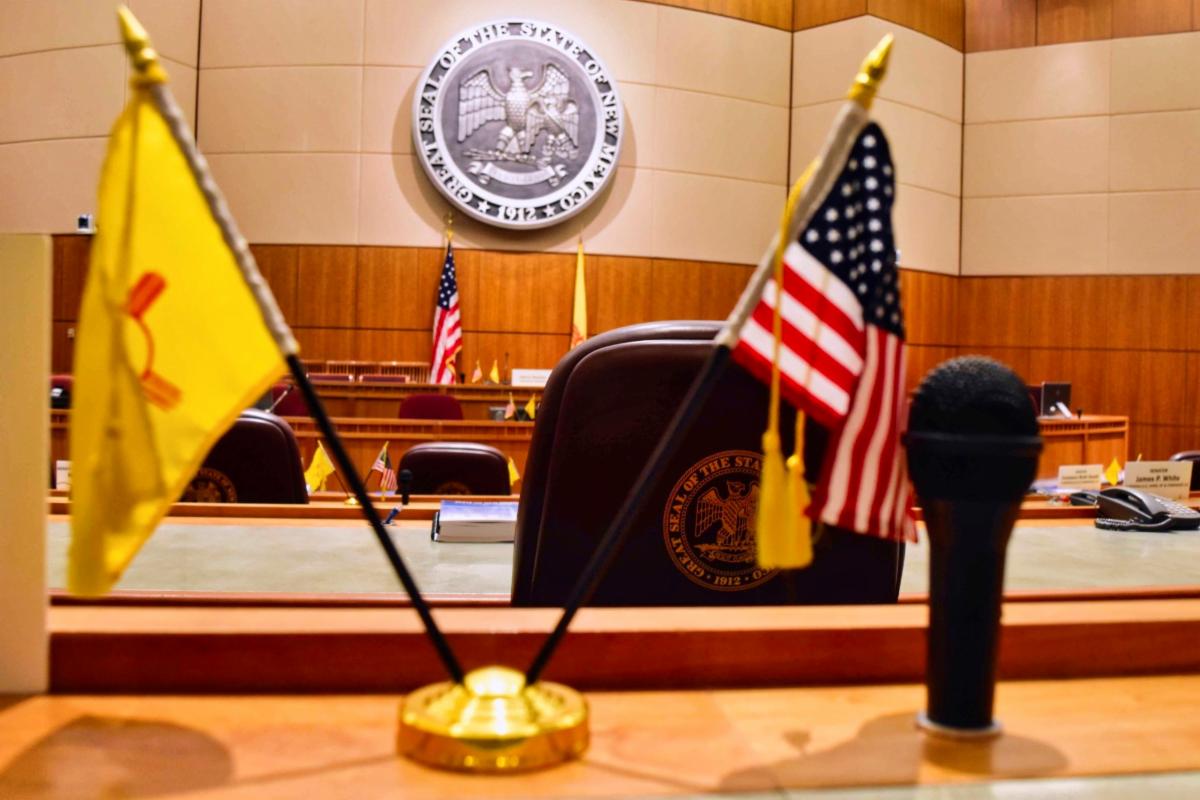SENATE TAX COMMITTEE OKS
ECONOMIC DEVELOPMENT GAME-CHANGERS

This afternoon the Senate Tax, Business and Transportation Committee took up two important bills designed to put New Mexico at the forefront of economic development competitiveness.
Senate Bill 169, the Strategic Economic Development Site Readiness Act, is sponsored by Majority Whip Sen. Michael Padilla and Rep. Meredith Dixon (both D-Bernalillo). The committee voted 9-0 to send its committee substitute on to the Senate Finance Committee.
Senate Bill 170, NMFA Definitions, Funds and Rates for Economic Development, is sponsored by Padilla, Dixon and Reps. Joshua N. Hernandez (R- Sandoval) and Joy Garratt (D-Bernalillo). The committee voted 7-2 to send it with amendments on to Senate Finance as well.
Both bills are directly connected to the Greater Albuquerque Chamber of Commerce’s theme this session of increasing New Mexico’s competitiveness. As we said in our Legislative Agenda (click here to read it):
“The Chamber’s primary goal for the 2025 session is to encourage lawmakers to position our state to better compete for new businesses, workers, residents and visitors. Competition is a choice, and in New Mexico’s case, it will require leaders to prioritize and address a set of serious challenges that currently put our state at a competitive disadvantage. … Despite the state’s impressive revenue picture, New Mexico’s economic growth – outside of the oil and gas industry – is tepid, our population is not growing, and participation in the labor force lags most other states. Soaring energy revenues will not last forever, leaving New Mexico with an extraordinary opportunity – while the state remains flush with cash – to build a more dynamic and competitive economy that is sustainable for the long haul.”
The Chamber’s D’Val Westphal, executive vice president of policy and programs, was there with testimony in favor of both:
“SB 169 is all about increasing the number of sites ready for business development and reducing the amount of time businesses must wait for their site to be ready for building.
“Right now we have very little inventory for medium- to large-scale commercial, industrial or other uses. And these sites can take anywhere from two to four years or longer to prepare utilities and be ‘ready’ for development.
“Rather than risk asking the next Netflix or Amazon if they can wait a few years, SB 169 proactively allows New Mexico to create an inventory of strategic economic development sites around the state that will make New Mexico more competitive with other states and attract significant capital investment, tax revenues and jobs.”
And regarding SB 170:
“SB 170 is another pragmatic bill that allows New Mexico to do the literal groundwork necessary to be truly ready when economic development opportunities arise.
“Allowing public utilities to recover prudent and reasonable costs for certain economic development projects will encourage investment in future projects today.
“And oversight from both the Economic Development Department and the Public Regulation Commission as well as a 10-year sunset are designed to ensure projects indeed pay dividends.”
Padilla explained that “we have, thanks to the Legislature, developed a variety of very successful incentives here in the state of New Mexico” for economic development. “But one thing we don’t have are sites to sell. The primary objective of this legislation is to enhance the state’s economic development strategy by identifying, assessing and preparing strategic sites for immediate business development.”
“When you get off the airplane, we want to be able to immediately usher you over to locations that are ready to rock and roll.” He added that goes for New Mexico businesses looking to expand as well.
SB 170 and 169 fall directly into the Chamber’s legislative advocacy category of Growth: Incentives and Marketing. They go hand-in-hand with our priorities in job training, professional licensing compacts, tourism marketing, beautification and closing funds. Having sites ready to go is an essential part of attracting investments, revenues and jobs.
We applaud the sponsors and Senate Tax Committee members for understanding this, and we’ll be in Senate Finance to let you know what happens with SB 169 and 170.
YOU’RE THE GOAT! SCAPEGOAT, THAT IS

When it comes to our oil and gas industry, environmental organizations and many legislators want to lay just about every environmental problem on them. Today, House Bill 259, sponsored by Rep. Matthew McQueen (D-Sandoval & Santa Fe), was just one more bill in a long parade of anti-industry missiles we’ve seen fired at the folks who bring in about half of the general fund revenues to the state and pour cash into the overflowing state treasury. Nevertheless, the House Energy, Environment and Natural Resources Committee paddled the bill along to the House Judiciary Committee on a 7-4 party-line vote, Ds for and Rs against.
The bill seeks to impose staggering fee and fine increases on violations of the Oil and Gas Act. To give you an idea of what we mean by staggering, fees are increased by 300% and fines by 1700%. Worse yet, there seems to be no evidence-based rationale except “this is what we do in other environmental laws” or, “this will bring offenders to the table.” And, the fee and fine increases are hiked every year by the cost of living.
Terri Cole, president and CEO of the Greater Albuquerque Chamber of Commerce, offered this testimony in opposition:
“The fee and fine increases are pretty staggering. If the basis is to adjust for inflation, then we would appreciate seeing what the base year is and the calculations that lead to the proposed adjustments. Fines, on the other hand, are presumably designed for punishment and deterrence. So what justifies these extraordinary increases? What’s the reference point? We are very concerned that the proposed adjustments should not be arbitrary but rather backed up with some kind of evidence that explains the need and the presumed effectiveness. At this point, we oppose HB 259.”
According to proponents, the bill is aimed at generating more fee revenue for the Oil Conservation Division (OCD) because it needs more IT staff, yet they could not specify how many are needed or at what cost. As Rep. Rod Montoya (R-San Juan) pointed out, this request supersedes the budget process. Agencies should seek funding through appropriations, not separate legislation. Moreover, the fees are increased annually by cost-of-living adjustment regardless of budget needs or the condition of the industry. The Legislature, not the agency, should determine fee levels.
With regard to fine increases, beyond the “this is the way we do it in other environmental laws,” there is no baseline reference point to support increases of this overwhelming magnitude. Proponents argue that steep fines are needed to get “bad actors” to the table to resolve violations. Rep. Jon Henry (R-Eddy, Chaves & Otero) pointed out that, according to the OCD, only about 5% of operators are “bad actors.” “Why punish 100% of the industry for such a small minority?” Good question.
Rep. Mark Murphy (R-Chaves), himself an owner of oil production, pondered why New Mexico is so poor. Why do we have so many social issues? He averred that it isn’t the people; it isn’t the lack of natural resources. In his opinion, we’re poor because we make poor policies. He observed that he has seen a “slew” of bills that target one industry, which sends bad signals and has a chilling effect on doing business in New Mexico. He takes offense at the notion that no matter what New Mexico does, somehow the oil and gas industry will just go on. He observed that California thought the same thing and now their last remaining oil company, Chevron, is moving its headquarters to Texas.
In support of HB 259 are the governor’s climate advisor, the Western Environmental Law Center, EarthWorks and Santo Domingo pueblo. In opposition are the Independent Oil Producers Association, the New Mexico Oil and Gas Association, the Permian Basin Petroleum Producers and the New Mexico Business Coalition. Several of the opponents note that the attitude of the OCD has moved from collaborative to remedy violations to adversarial and punitive. NMOGA flatly stated that the fees and fines are “punitive and arbitrary.”
The bill moves next to the House Judiciary Committee which, hopefully, will look at some of the legal concerns and the potential for engendering litigation. We’ll keep you posted.
LOW-INCOME UTILITY RATE RELIEF ENDORSED

Like everything else, the price of energy at the gas pump and for electric and natural gas service has increased. House Bill 91, sponsored by Rep. Christina Ortez (D-Taos) and Patricia Roybal Caballero (D-Bernalillo) seeks to allow the Public Regulation Commission (PRC) to approve lower rates for gas and electric customers or other programs that can help the low-income folks lower their home energy bills. According to Ortez, low-income consumers spend as much as 20% of their household income on utility bills.
El Paso Electric, PNM and New Mexico Gas Company all stood in support of the measure, which passed the committee on a vote of 7-4, Ds in favor and Rs opposed. Greater Albuquerque Chamber President and CEO Terri Cole prepared testimony in support as well:
“I’m here in support of HB 91. It’s pretty obvious that many people are struggling to make ends meet post-COVID and with the high prices for just about everything. This bill is designed to help low-income utility customers pay their bills. We think of this bill as a short-term measure of necessity rather than a permanent way of life. Our long-term goal should be the creation of many good, high-paying jobs in the private sector.
“The bill provides an exception to the general rule of cost-based ratemaking. Currently, the PRC has been given exceptions for economic development rates, rates designed to retain load, or energy efficiency programs aimed at lowering energy costs for low-income customers. HB 91 would allow, but not mandate, an additional one. We urge your support for HB 91.”
Opposition is based on concerns that the cost of lower rates to low-income consumers will result in raising rates to other customers to subsidize the rate reduction. Rep. Rod Montoya (R-San Juan) specifically said this bill will raise rates on the middle class. Also, the definition of who is low-income is not clear. The bill now goes to the House floor.
SOCIAL MEDIA/TEXTING CRIME UPDATE ADVANCES

Steve Jobs introduced the iPhone to the world on Jan. 9, 2007, and the Android phone wasn’t far behind. This was 18 years ago. The current generation of kids don’t actually know what it means to “hang up” a phone.
Modern challenges require modern solutions. That’s why former-prosecutor-turned-lawmaker Rep. Andrea Reeb (R-Chaves, Curry & Roosevelt) presented House Bill 287, Telephone, Text & Social Media Crimes, to the House Consumer & Public Affairs Committee this afternoon.
Enrique C. Knell gave the committee the Chamber’s view on Reeb’s bill:
“We absolutely support Rep. Reeb’s bill to update criminal law and account for the changing ways in which we communicate with each other. Our No. 1 goal this session is to position our state to better compete for new businesses, workers, residents and visitors. A major part of achieving that goal is to make it hard to be a criminal in New Mexico. We think HB 287 is a good step in that direction.”
Reeb presented officer Berling from the Las Cruces Police Department as her expert witness. Berling and his colleagues asked Reeb to carry this legislative change to help them do their jobs. He says he has investigated hundreds of crimes the last decade that involve threatening behavior over text or social media, from domestic violence to neighbor disputes and even gang activity.
“It’s been on the books since at least the ’60’s. I don’ know that they anticipated the prevalence of social media and text messaging when the law was adopted,” said Berling. “So I think it’s important to update it to make our jobs as police officers in doing these investigations a little bit easier, and to give proper recourse for victims of this type of conduct.”
Basically, the current law is just insufficient for addressing the unique nature of telephonic harassment. and passing Reeb’s bill will modernize the statute.
HB 287 passed on a 6-0 vote and goes to House Judiciary next.
STOP, LOOK AND LISTEN BILL PASSES HOUSE

Stop, Look and Listen – that’s the mantra of House Bill 160, sponsored by Rep. Patty Lundstrom (D-McKinley). The bill passed the House today on a vote of 61-2. Currently at railroad crossings, only trains have the right-of-way over all other traffic. The bill would add “other on-track equipment” at all railroad-highway grade crossings. “Other on-track equipment” is “any car, rolling stock or other device that alone or coupled to another device is operated on stationary rails.” The bill would require all drivers, including school bus drivers and drivers carrying hazardous materials, to abide by certain stopping distance requirements when approaching “other on-track equipment,” not just trains.
The Chamber supports the measure because it is common-sense legislation to help protect both the public and train equipment operators. There has been an increase in accidents and injuries resulting from failure to stop, look and listen for any equipment operating on the rails. Lundstrom said the bill is supported by the rail industry and labor and would only require vehicles to stop when you see maintenance vehicles working on railroads. The bill now moves to the Senate.
IN THE HOUSE

“Build, Baby, Build!”
House Memorial 3, sponsored by House Minority Leader Gail Armstrong (R-Catron, Sierra, Socorro & Valencia), who recently celebrated the birth of her 13th grandchild, recognizes the contributions of home builders in New Mexico. This organization was founded here in 1959. It’s mission is to provide safe and quality buildings. Rep. Harlan Vincent (R-Lincoln & Otero) reported that a sawmill is being constructed on Mescalero land. This not only provides lumber for construction but also helps thin the forest to prevent destructive wildfires. Speaker Javier Martinez (D-Bernalillo) summed it up, “Build, baby, build!”

Santa Fe County Recognized for Gracious Hospitality
It was also Santa Fe County Day in the House. Many members expressed their appreciation for the gracious hospitality of the county hosting the legislative session. The county, established in 1852, rightly prides itself on promoting various cultures and traditions. Rep. Andrea Romero (D-Santa Fe) recognized a fairly new program aimed at helping the formerly incarcerated transition to life outside. It is a work program at the Escondido restaurant founded by Chef Fernando Ruiz, who turned his life away from gangs (for which he served time in Arizona) to cooking. He has won numerous awards for his innovative culinary skills. Here’s a bit of interesting backing from the Santa Fe! publication:
Escondido is more than just a restaurant; it serves as a catalyst for positive change in the community. Ruiz, alongside co-founders Ralph Martinez, a community activist in Española, and Jamai Blivin, CEO of the workforce development nonprofit Innovate+Educate, established the Entrepreneurial Institute of Northern New Mexico Re-entry Program. This eight-week program, supported by a $75,000 allocation secured by State Rep. Andrea Romero in the 2023 legislative session, provides inmates hands-on culinary training, a butchery course and vital post-release support.
Don’t you just love it when a plan comes together? Congratulations folks on a wonderful contribution!
SIGNING OFF FROM SANTA FE

Well folks, tomorrow is going to be a doozy – both House Bill 8, the public safety package, and House Bill 11, the Paid Family and Medical Leave Act, are up in committee at the same time. The first in the Senate Judiciary Committee and the latter in the House Commerce and Economic Development Committee. There is a committee substitute bill for HB 11, which we are analyzing as we speak. More on that tomorrow. Tomorrow is also national chocolate mint day – just thought we’d give you the “scoop” on that one (we know, ugh). Until manaña, have a good evening.




